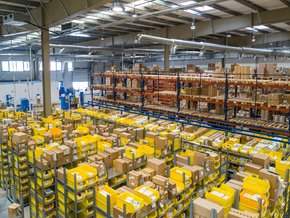How Philips is Making Healthcare Supply Chains Sustainable

Philips is listening to the Centers for Disease Control and Prevention about the health impacts of climate change. With a keen awareness of the significant opportunity presented by addressing environmental sustainability in healthcare, Philips is pioneering initiatives to reduce its environmental footprint while simultaneously improving health outcomes. Maintaining sustainable procurement and supply chain practice is a vital part of the wider strategy of the organisation.
Increasing energy efficiency and renewable energy
Hospitals are among the highest energy consumers and greenhouse gas emitters. At Philips, improving energy efficiency is a key priority. For instance, their Azurion image-guided therapy platform offers a 10% reduction in energy consumption over its predecessor. Philips also promotes sustainable user behaviour to further reduce energy consumption. Moreover, the company advocates for renewable energy sources to power its operations
Such as the Mutkalampi wind farm in Finland, which Philips, HEINEKEN, Nobian, and Signify committed to contracting renewable electricity from the wind farm for the first 10 years through the Virtual Power Purchase Agreement in 2020.

Increasing circularity and reducing waste
Philips prioritises circularity in product design and manufacturing, aiming to ‘do more with less’ by extending product lifetimes and promoting reuse.
Notably, Philips has developed helium-free MRI technology (BlueSeal), a fully sealed magnet supporting sustainable, helium-free-for-life MR operations, simplifying installation and reducing disruptions to MR services.
BlueSeal's highly efficient micro-cooling technology requires just 7 litres of liquid helium for cooling, compared to 1,500 litres for conventional magnets. With over 1,060 units globally installed, MRI scanners with BlueSeal technology have saved over 1.9 million litres of helium since 2018.
Philips also offers the SmartPath for MR portfolio, enabling healthcare providers to seamlessly upgrade their existing MR systems to the latest generation without costly new equipment purchases or disruptive installations. SmartPath not only streamlines workflow but also minimises the environmental impact associated with manufacturing and transporting new equipment. Moreover, SmartPath delivers tangible benefits beyond sustainability, with software upgrades like SmartSpeed leading to remarkable efficiency gains. With scan times reduced by up to three times and a 32% average reduction in power consumption per patient scan, SmartPath embodies a paradigm shift in healthcare technology, blending sustainability with performance to deliver superior outcomes.
“We need to design circular systems, which respect the constraints on the planet’s resources,” adds Robert Metzke, Philips Global Head of Sustainability.

“This requires collaboration across the value chain, a deep understanding of material flows, and focusing on what truly creates value for our customer.”
Additionally, Philips supports healthcare providers in overcoming financial challenges by offering sustainable solutions.
As a member of DITTA, Philips advocates for responsible management of materials and products, offering trade-in options and refurbishment services through its Circular Edition programme.
This initiative extends the lifespan of medical equipment, reducing costs and environmental impact. Philips also ensures responsible end-of-use management, including recycling valuable parts and materials, to minimise waste generation.
Through its EcoDesign programme, Philips focuses on eliminating waste and pollution across various aspects of healthcare technology, collaborating with customers to optimise the lifespan of medical consumables and minimise unnecessary disposal.
Driving digitalization for equitable and sustainable care
Digital health technology and AI are crucial for improving healthcare system efficiency, productivity, and financial sustainability. They connect patients with necessary services, improving access to care while lowering environmental impact and costs.
Through dematerialization, these solutions optimize resource use, promoting cost-effective care settings like home-based services. This reduces patient travel, cutting CO₂ emissions. Additionally, cloud-based solutions lower environmental impact by reducing hardware and energy needs.
By tackling digital waste and streamlining workflows, healthcare systems can enhance efficiency, cut costs, and shrink their environmental footprint.
Buying sustainably and decarbonizing the supply chain
In healthcare, the supply chain contributes significantly to carbon emissions, accounting for a staggering 71%. Procurement teams wield considerable influence in driving sustainable practices by prioritising value-based sourcing over cost-centric approaches.
There's a growing trend towards integrating Green Procurement criteria into medical equipment purchases, with anticipated mandates in the EU and US.
Philips ensures responsible end-of-life management for equipment and materials, championing refurbishment, recycling, and circularity. By offering guidance to buyers and collaborating with industry bodies like DITTA and COCIR, Philips advances sustainable procurement practices.
With a focus on suppliers committed to science-based carbon reduction targets, Philips aims for at least half of its suppliers to meet these goals by 2025. This commitment reflects Philips' pioneering role in spearheading sustainability across healthcare supply chains, setting a benchmark for the industry.
******
Make sure you check out the latest edition of Procurement Magazine and also sign up to our global conference series - Procurement & Supply Chain LIVE 2024
******
Procurement Magazine is a BizClik brand






